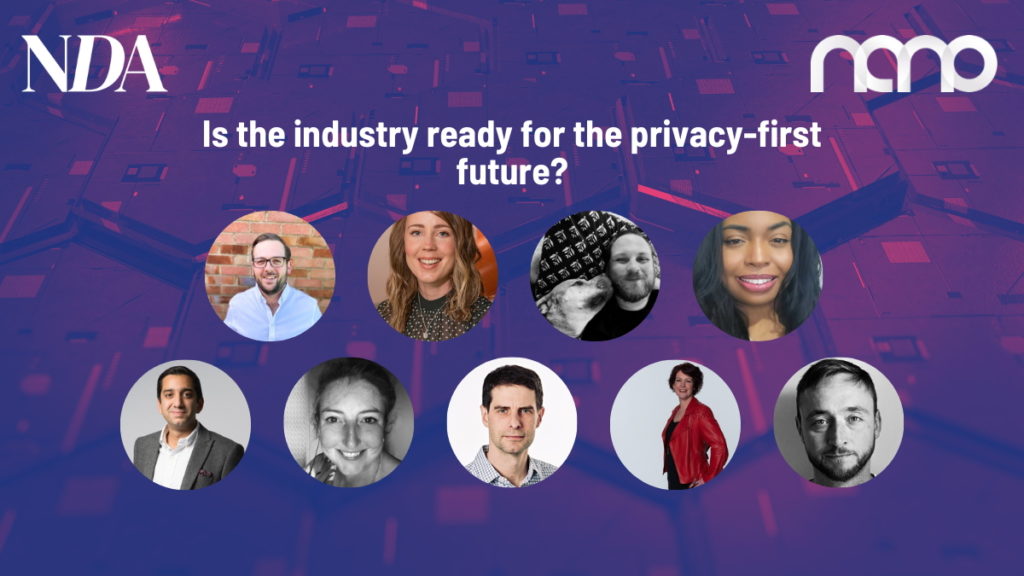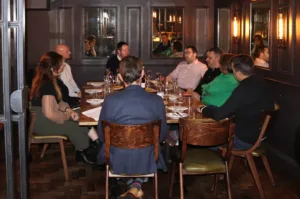The topic of the deprecation of third-party cookies, and the privacy-first future, has been one of the biggest talking points across the digital advertising industry for a number of years now. With the significantly delayed deprecation officially on its way in 2024 (we hope), is the industry actually heading in the right direction and placing privacy at the forefront of everything it does?
To discuss this and other key talking points, we gathered a panel of experts. Chaired by NDA’s Editorial Content Manager Michael Feeley, the roundtable – in partnership with Nano Interactive – featured Alex Newberry, Chief Revenue Officer, Content Ignite; Chloe Nicholls, Head of Ad Tech, IAB UK; Angus Deuchar, Client Development Lead, Performics; Faisal Karmali, Senior Director, International Business Operations, CNN International Commercial; James Northway, Global Head of Data, Wavemaker; Micarla Joseph, Senior Director, Buying, M&C Saatchi Performance; Natascha Chamuleau, Chief Advertising Officer, WeTransfer; George Lintott, Client Product Partner, Dentsu UK&I; and Heather Lloyd, Head of Product Marketing, Nano Interactive.
IAB UK’s Nicholls kicked off the discussion, stating that the industry needs to make privacy “more of a focus” in everything that it does. She said: “It needs to be front of mind for every solution working in that space. That’s how we need to focus on really shifting the balance.
“The problem is that even defining privacy is hard. It means something slightly different to different companies. So, I think starting with the basics, and then moving forward, is how we’re going to be able to do it.”
The fact that the industry is becoming more focused on privacy is a “really good trend”, according to WeTransfer’s Chamuleau. However, she agrees that the definition of privacy is something that’s blocking the way currently.
“I think privacy is becoming more and more important. At WeTransfer, we’ve always been privacy-first, and have never really gathered and leveraged user data. And this has always been appreciated by our users,” said Chamuleau.
“There definitely are a lot of definitions about what user safety is, and what privacy actually means to everyone. So, I think it’s a really good idea to deepen and define that better going forward, because change will come again.”
Proving value through the fear
CNN International’s Karmali thinks that many of the concerns around privacy come down to “fear mongering”.
“I’ve always said that the death of the cookie is like the year of the mobile – it’s been happening for years and years, let’s just get on with it. But that fear mongering piece is, unfortunately, getting worse the more it’s talked about,” Karmali continued.
“Even the word ‘privacy’ puts fear into people. What do you mean you want me to give away my privacy? As a consumer, you would never say yes to that. I think it’s about explaining it as intelligent advertising, as opposed to ‘we need you to accept that we’re taking away your privacy’. It comes down to trust between us and that user.”
Dentsu’s Lintott agrees that trust is important, pointing to the fact that consumer trust has been eroded over the years, due to a number of instances of the industry falling short. He said: “There has been an erosion of consumer trust in what we do – going back to some of those malpractices around overly intrusive ad formats, right through to the other end of the scale where you’re looking at Cambridge Analytica. So, we have to use this as an opportunity to reset and do things right. We have to talk to consumers and educate them about that value exchange, so we can continue to support quality journalism. Otherwise, it’s just going to go the other way, and the walled gardens will win out.”
Wavemaker’s Northway also feels that education is vitally important, because “I’m not quite sure if consumers really understand what we’re talking about when we look at the basic concept of ‘you’re reading the news, and it’s free’.”
“Younger audiences definitely understand privacy, but I’m not sure if they understand that basic value exchange,” continued Northway. “I think that my parents understand that most newspapers are funded by advertising, and that ITV is funded by advertising. But for younger generations consuming information across hundreds on online platforms, I don’t think that value exchange is as explicit. That might be a stereotype, but they’ve been born into a world where everything online is free, and the privacy versus value paradox isn’t as obvious.”
The fear surrounding third-party cookies, and the need for education, extends to advertisers as well, according to M&C Saatchi’s Joseph. And this fear is causing advertisers to lean heavily on the walled gardens.
“From an advertiser standpoint as well, I think there is an initial fear of ‘what are we going to do?’, and the knee-jerk reaction is to rely more on the safety of first-party data within walled gardens,” she said. “There is an education piece around what advertisers can do outside of relying on that third-party cookie data. We need to take the time to educate ourselves as well, and work toward spending more outside of those walled gardens.”
The publishing opportunity
The need to support quality journalism is something that is very close to the heart of Content Ignite’s Newberry, but he’s on the fence about the value of getting rid of cookies.
“We’ve seen that ad blocking is more prevalent in the younger generation. That would tell you that they do care about being served bad ads at least, or being chased around the internet, like we have been doing for the last decade.
“I run the Independent Publishers Alliance, [alongside my role at Content Ignite], so I have two hats. I agree that something had to be done from a user’s point of view. But, from a publisher’s point of view, I don’t like it as much, because it feels like the value exchange still isn’t understood. Advertising does need to be there to pay for quality journalism and for those sites to run.”
Nonetheless, Performics’ Deuchar believes there is an opportunity for publishers to “own more of their data”. He explained: “Clever targeting solutions on all publishers is much easier. Even in terms of contextual targeting, it’s very easy to talk about, ‘I landed on X page, which says Y, then I’m this’. But what about the journey? Have they read three or four articles on this publisher? Have they come from two or three different pages? Can we learn a bit more like that?
“That’s difficult for small publishers, but even the independent, medium-sized publishers have an opportunity to do clever things on their advertising solutions to create those segments.”
Overall, Nano’s Lloyd is ‘excited’ about the opportunity that has been presented by the deprecation of third-party cookies, but believes that the industry would have never given cookies up had it not been “forced” to.
“It’s a good opportunity for us to move away from that reliance on something that only has a singular view of what a measurement of success is. It’s an exciting time to be in, because we were never going to move away from cookies unless we were forced to. It was so easy. We’ll probably never be here again at a time when we have one way of tracking everything across everything. And that’s already effectively over, whether Google defers for another 10 years or not, there’s already issues from an iOS perspective,” said Lloyd.
“We have to think a bit broader. And I think we’ve seen, in the last 12 months, a wealth of changes within the industry with opportunities popping up and different ways to measure things. I don’t think that would have come around in a 12-month period had we not been forced into it kicking and screaming.”
Part two of the roundtable can be read here.









